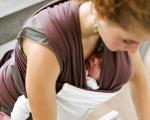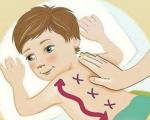Can a child get sick from a Komarovsky fan. Can it be blown by a fan
In principle, you can also catch a cold from a fan (for example, catch a runny nose) if it works at maximum power and is directed strictly at you, and in such heat a person is all wet with sweat.
Modern fans usually have several modes.
To eliminate the risk of fan colds, set the fan to "jerky" (or intermittent) mode, which simulates natural calm wind. In this mode, the "head" of the fan itself will make turns, either directing a stream of air at you, or turning away from you. And the mode of breath will be different - sometimes a little more intense, sometimes weaker.
Unless you're a walrus or just a hardened person, try not to get under the fan just out of the shower, especially with a wet head.
★★★★★★★★★
You can catch a cold from the fan. You can even earn pneumonia, if the body is weakened - immunity is reduced.
You can really catch a cold from any source of cooling when there are problems:
Unsuitable means - malnutrition, affecting the nervous, endocrine and digestive systems (constipation, inflammation);
- intestinal dysbacteriosis;
- untreated diseases;
- deficiency of vital vitamins, among which the main role is given to vitamin B1, B6, PP and some others;
- an excess of minerals and vitamins (there are not so many to list, but it is worth noting heavy metals, iron, fat-soluble vitamins);
- dehydration of the body (lack of fluid, diarrhea, profuse sweating, etc.);
- slagging of the body;
- problems with acid-base balance;
- thick blood.
For example, bedridden patients, who already have congestion in their lungs, use a ventilator in the summer, when it is hot. Spin it around until it freezes. A weakened organism, which is almost immobilized, falls ill very quickly.
The main thing - not to get sick - cleanliness in the lungs. If they have problems (accumulated sputum, inflammation, allergies) - any breath of wind leads to serious consequences.
The cooling of the larynx, and then the bronchi and lungs, of course, will happen faster if there is an air conditioner in the house. It affects both the young and the elderly. On a personal example, I observe an acquaintance who works in a large oil company, which has been sick with pneumonia for the 4th year in a row (in summer!) She herself is not old, and their air conditioners are cleaned - this is not Legionnaires' disease))
Summary - with existing problems in the body, it is possible to catch a cold and get sick from a fan.
★★★★★★★★★★
It is quite possible to get sick, because any directed flow of cool air can imperceptibly supercool the body, and there a cold is not far away.
I myself have already got used to the fan, I just already know how to be friends with him. And at first it also happened, it was blowing, the ear hurt. Firstly, you need to get used to it gradually, and only in a normal state - not after the heat immediately under it, and not after a shower, when wet, etc.
Unlike an air conditioner, it is much safer, which means it saves you from the heat, and you get sick less. It is enough to avoid sudden changes in body temperature, and then problems should not arise. And, of course, it all depends on your personal immunity.
And in order to minimize the risk of getting sick, it is worth drinking natural immunomodulators that support the body as a whole, such as Echinacea tincture.
Protecting a child from a cold and reducing the risk of contracting viruses is quite realistic, says Dr. Komarovsky.
As you know, if a child, and even an adult, meets with a virus, it is highly likely that he will get sick. So the main task is to stay away from sources of infection. If you follow these rules, the likelihood of infection of the child will be significantly reduced, and if it does happen, the child's body will cope with the disease faster, and the likelihood of complications is minimized.
- Avoid large crowds whenever possible, especially indoors. This is not always possible with children who go to kindergarten or school. However, during the season of viral infections, especially when the flu arrives, try to avoid crowded places.
- The probability of catching the virus in the fresh air is an order of magnitude lower than indoors - if you can walk, it is always better than riding in crowded public transport.
- Try to keep your distance - the closer you are to a person, the more likely you are to contract an infection, the causative agent of which is transmitted by airborne droplets.
- If someone in the house has already fallen ill, a runny nose and cough have begun, if possible, isolate children from sick children, select individual household items and utensils (towel, cup, spoon, plate).
- Viruses, causative agents of SARS and influenza, are transmitted not only by airborne droplets, but also by contact. Wash your hands often, don't touch your face, and teach these rules to your children. If the child can not hold onto the handrails in transport, this will help. Hold him by the hand.
- The maximum probability of infection is where there are many children in one place. Be especially careful when visiting a children's clinic.
- Wet cleaning in the house, regular ventilation and humidification of the air fundamentally reduces the likelihood of infection. The concentration of pathogenic microbes in warm and dry air is much higher; in household dust, they can remain viable for up to several days.
- Maintain in the room the optimal (from the point of view of Komarovsky) air characteristics - temperature 16-22 degrees, humidity up to 70%. At the same time, no one should merge - dress yourself and dress the child warmer.
- Washing your hands regularly can greatly reduce the risk of infection. If there is no opportunity to wash your hands (for example, on the road), use wet wipes.
- Rinse your child's nose with saline several times a day - this will moisten the mucous membranes of the respiratory tract and maintain their protective properties. You can make your own moisturizing solution: dissolve 1 teaspoon of table salt in 1 liter of boiled water at room temperature.

In addition to these simple rules, Komarovsky reminds once again:
- Medical gauze does not protect against viruses and infection. It is worth putting on a mask for someone who is already sneezing and coughing, and only so that the discharge along with the viruses does not scatter over a long distance.
- Drugs that can boost immunity and protect a child from a viral infection have not yet been invented.
- In addition to the above, the risk of contracting SARS is reduced by proper balanced nutrition, good sleep, an active lifestyle and a positive attitude towards life.
Moms and dads should clearly understand that a baby who is more than two weeks old in terms of heat exchange is not very different from yourself. Accordingly, if you are very hot, then he is uncomfortable. And if you don't want your newborn to develop prickly heat (red small pimples), then don't wrap the baby in warm blankets at temperatures over 28 degrees. Leave him completely naked for 10-30 minutes so that the baby's body breathes.
Drafts and the newborn
Here it is necessary to clearly define what to call a draft. In most cases, caring grandmothers running around the baby close all windows and doors at any temperature and weather. This is highly discouraged. The apartment should be constantly ventilated and the child should strengthen his body. The child will feel quite comfortable away from an open window or door where there is a barely noticeable breath of air. In such conditions, he definitely will not catch a cold. If the temperature outside is higher than in the room (30 - 35 degrees), then there should be no reason for excitement at all. In what cases are a draft and a baby incompatible? Firstly, if it is much colder outside than in the room. In this case, the child may occasionally be exposed to a stream of cold air while awake, but in no case remain motionless for any length of time. That is, it is very dangerous to put a cradle or bed with a resting or sleeping baby near an open window in winter. Secondly, if the baby after taking a bath. An overheated baby must be protected from any air currents until it is completely cool and dry.
Baby and fan.
Here we can fully agree with the famous pediatrician Komarovsky Evgeny Olegovich. "Nature could not create a creature capable of suffering from a jet of warm air." If the temperature in the apartment is more than 30 degrees, then a fan running at low speeds (not directed directly at the child) will not harm anyone. But it is impossible to direct the fan turned on at full power to a sleeping child. And of course it is not permissible to direct the fan at the baby after bathing.
Why is air conditioning dangerous for a baby?
Exactly the same as for an adult. Sit under a stream of icy air for an hour and 99% either catch a cold or catch a cold in some part of the body. Make the temperature at home 20 degrees when it is 34 degrees outside and when you leave the house you can lose consciousness. The recommendations are the same. Everything must be done without fanaticism. If it is very hot then air conditioning is necessary. Just do not lower the temperature by more than 6 degrees and do not direct the air flow from the air conditioner not at yourself or at the baby.
The child must get used to the wind and the fan and the air conditioner. And if you constantly protect him, then when he grows up, you won’t get any problems.
Hello dear subscribers of the site "I want to know everything!"
Many people ask the question - is it possible to get sick from the fan?
This question is quite important, despite its simplicity.
If everything is clear with the air conditioner and no one doubts that it is possible to get sick, then with the fan the issue is not so unambiguous.
Many people start using fans only because they are much cheaper and therefore more affordable. But every year more and more owners of air conditioners prefer to buy a fan. You ask why?
The answer is quite simple, the fan is much safer than the air conditioner and, when used correctly, virtually eliminates the cold.
But it is also important to take into account the fact that its illiterate use entails not only the possibility of catching a cold, but even catching pneumonia. Yes, yes, it is pneumonia in the midst of summer!
To prevent this from happening to you, follow very simple recommendations and a floor fan will become your best friend.
The very first and most important thing is not to direct the flow from the fan towards yourself point-blank. It is best to set the fan so that the flow of cool air goes above your head or to the side. Believe me, this is quite enough to create an atmosphere of comfort in the room.
Second. Never turn on the fan if you are already sweaty. Most often, people get sick precisely because they ignore this important fact. Be sure to cool down before the fan blows on you.

And third. Never stand in the area between an open window and a fan. In this position, a draft appears, which can provoke a disease such as otitis media, with all the ensuing consequences.
Write in the comments what do you think is safer for yourself - a fan or an air conditioner?
If you liked the video, be sure to like or thumbs down, in general, at your discretion, friends.
And of course, subscribe to our channel, click on the bell and you will never miss interesting stories again.
We offer you to watch other videos on our channel. Here you will find a lot of interesting and unusual.
All the best to you friends!




